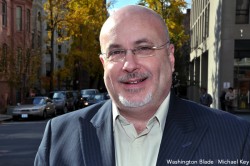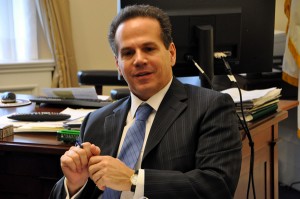National
Gay congressional candidates excel in 2Q fundraising
Baldwin rakes in $2.2 million; Tisei bests Dem incumbent

Gay and lesbian candidates running for Congress posted strong fundraising numbers in the second quarter in a year when more out contenders than ever are making bids for high office.
The Washington Blade examined the second quarter campaign finance reports for the eight candidates seeking office in the U.S. House and U.S. Senate that were endorsed by the Gay & Lesbian Victory Fund. The second quarter numbers represent fundraising for the candidates starting in April through June and were posted recently to the Federal Election Commission website.
The eight endorsed candidates are among 13 identified openly LGBT candidates pursuing seats in the House and Senate throughout the country — an unprecedented number for any election cycle.
In the most high-profile race, lesbian U.S. Senate candidate Tammy Baldwin has been doing well in fundraising in her bid to become the first openly gay U.S. senator. Baldwin took in $2.2 million during the second quarter. That means she has raised $6.7 million this cycle while spending $3.96 million and having $3.5 million in cash on hand.
Technically, she didn’t come out on top in comparison to one of her Republican opponents. Eric Hovde, a hedge fund manager who recently entered the race, posted $2,494,211 for the second quarter. But Hovde, whose net worth has been estimated at $58 million, has spent millions on his own campaign and spent $3.5 million to make his name more well known. Others in the race came out behind: former Wisconsin Gov. Tommy Thompson raised $834,000, former congressman and gubernatorial candidate Mark Neumann raised $733,450 and State Assembly Speaker Jeff Fitzgerald raised $41,033.
The race between Baldwin and her potential Republican opponents appears tight. According to data published last month from Public Policy Polling, she’s in a dead heat with Novde, who leads her 45-44, and Thompson, whom she ties 45-45. Baldwin leads Neumann by 45-41 and Fitzgerald 46-42.
Perhaps the most surprising numbers come from Richard Tisei, a gay Republican former state legislator in Massachusetts, who raised $571,371 in the second quarter in his bid to represent Massachusetts’ 6th congressional district. That means he outraised Rep. John Tierney (D-Mass.), who raised $421,944 — even though he’s an incumbent Democrat running in a heavily “blue” state.
In a statement, Tisei, who outraised Tierney in the first quarter of 2012, thanked donors.
“I am consistently impressed with the strong support I am receiving from individual donors in support of my candidacy,” Tisei said. “In my wildest dreams, I wouldn’t have imagined that so many people would be supporting our message of change with their pocketbooks — particularly in these very tough economic times.”
The fundraising numbers for the second quarter mean Tisei has raised $1,237,000 thus far this cycle, has spent $435,410 and has $802,000 in cash on hand. Comparatively, Tierney has raised $1,325,650 this cycle, has spent $820,875 and has $693,000 in cash on hand.
On Wednesday, the D.C. newspaper Roll Call shifted the status of the race from “leans Democrat” to “toss-up.” The race is becoming competitive, in part, because Tierney, an eight-term U.S House member, has been under scrutiny because of controversy involving his family. Tierney’s brother-in-law, Daniel Eremian, was convicted of federal racketeering charges related to his operation of an illegal offshore casino, and Tierney’s wife was sent to jail for tax fraud related to this operation.
Tierney has a strong pro-LGBT record in the U.S. House: he voted in favor of “Don’t Ask, Don’t Tell” repeal, hate crimes protections legislation and a version of the Employment Non-Discrimination Act in addition to voting against the Federal Marriage Amendment.
Similarly strong numbers were posted in the second quarter by Mark Pocan, a gay Wisconsin Assembly member who’s seeking to represent Wisconsin’s 2nd congressional district. Baldwin is vacating the seat to run for Senate.
But Pocan is in a different situation because he still needs to win the Democratic primary, which is set for Aug. 14, and other Democrats are seeking the nomination to represent the party in the general election. Pocan raised $250,000 in the second quarter, besting his most serious competitor, Kelda Helen Roys, another state legislator in Wisconsin, who raised $130,833.
In a statement, Pocan said he accepted contributions from more than 3,300 donors over the course of his campaign, and 80 percent of donations came in increments of $100 or less.
“I am truly grateful for the outpouring of support from the District 2 community,” Pocan said. “I’ve met and talked to voters from Beloit to Baraboo, and it’s clear my message of progressive values with real results resonates with people.”
The second quarter numbers mean Pocan has raised $734,550 over the course of his campaign, has spent $280,635 and has $454,000 in cash on hand. Meanwhile, Roys has raised $392,393, spent $130,833 and has $190,120 in cash on hand.
Not all gay candidates are faring as well. Sean Patrick Maloney, didn’t raise as much as incumbent Rep. Nan Hayworth (R-N.Y.) in his bid to represent New York’s 18th congressional district. Maloney, who in June won the Democratic primary, raised $319,000 in the second quarter, while Hayworth took in $459,000.
Tim Persico, campaign manager for Maloney, said special interests were the reason his boss didn’t raise as much as the incumbent Republican in the past few months, but said he’s still in good position to win.
“Sean Patrick Maloney doesn’t have the same profitable relationship with PACs and corporate lobbyists that brought Congresswoman Hayworth over a million dollars, but the outpouring of support from friends, family and even complete strangers has put him in a position to win,” Persico said.
Support from the LGBT community is coming from both sides in this race. Hayworth, who has a gay son, Will Hayworth, has been seen as a friend to the LGBT community since she took office at the start of last year. For example, she was among five Republicans to vote against a recent measure to reaffirm the Defense of Marriage Act when it came to the floor last month.
One of the gay U.S. House members seeking re-election — and who’s also facing a serious challenge in the primary and general election — also came out on top in fundraising last quarter. Rep. David Cicilline (D-R.I.), who last year became the newest openly gay member of Congress, raised $302,000 in the second quarter.
But his opponents aren’t too far behind. Anthony Gemma, a businessman, is Cicilline’s main challenger in the Democratic primary, which is set for Sept. 11, and raised $243,000 in the second quarter. The Republican in the race, Brendan Doherty, the Rhode Island State Police’s former superintendent, raised $221,711.
Cicilline is facing a complicated road to re-election because the city that he governed as mayor prior to winning election to the U.S. House, Providence, R.I., is facing financial problems. A report commissioned by the City Council last year blamed his administration for a lack of transparency and for making a series of moves – like tapping into Providence’s rainy-day fund – without councilors’ approval. The lawmaker apologized in April, saying he should have been more forthright about the financial condition of the city.
Polls are showing Cicilline could be in danger of losing the Democratic nomination. A poll from local TV affiliate WPRI published in May of 302 likely Democratic primary voters had Cicilline leading with 40 percent and Gemma following close behind at 36 percent — and 20 percent still undecided.
So far this cycle, Cicilline has raised $1,570,486, spent $771,723 and has $836,325 in cash on hand. At the same time, Doherty has raised $990,882, spent $321,532 and has $669,350 in cash on hand, while Gemma has raised $990,882, spent $87,071 and has $343,040 in cash on hand.
The bisexual lawmaker seeking to represent Arizona’s 9th congressional district is also coming out on top of a crowded field of a half dozen candidates seeking to win this newly created seat. Kyrsten Sinema, who’s bisexual and a state legislator, raised $367,554 in the second quarter. That’s above her most serious competitor in the primary set for Aug. 28, Andrei Cherny, who’s a former state party chair endorsed by former President Clinton. Cherny took in $301,895 during the same period.
In total this cycle, Sinema has raised $626,288, spent $267,492 and has $358,796 in cash in hand. In comparison, Cherny has raised $732,973, spent $263,913 and has $469,060 in cash on hand.
But the gay candidate didn’t come out on top in California’s 41st congressional district. Mark Takano, a school teacher and member of the Riverside Community College District’s Board of Trustees, raised $256,965, while his opponent, Riverside County Supervisor John Tavaglione, raised $337,667. Takano is seeking to become the first openly gay person of color to serve in the U.S. House in this newly created Democratic-leaning district.
So far this cycle, Takano has raised $758,156, spent $517,138 and has $241,093 in cash on hand. Meanwhile, Tavaglione has raised $790,027, spent $338,186 and has $451,991 in cash on hand.
Rep. Jared Polis (D-Colo.), who if re-elected would become the most senior openly gay member of the U.S. House, raised $59,503 in the second quarter. Those numbers put him at $848,000 in total for fundraising this cycle and leave him with $347,000 in cash on hand. An incumbent running in a safe Democratic seat, he’s not expected to face serious competition in his bid for re-election.
CORRECTION: An earlier version of this article incorrectly referred to Rep. Nan Hayworth as Nan Hunter. The name of Tim Persico was also misspelled. The Blade regrets the error.
Pennsylvania
Malcolm Kenyatta could become the first LGBTQ statewide elected official in Pa.
State lawmaker a prominent Biden-Harris 2024 reelection campaign surrogate

Following his win in the Democratic primary contest on Wednesday, Pennsylvania state Rep. Malcolm Kenyatta, who is running for auditor general, is positioned to potentially become the first openly LGBTQ elected official serving the commonwealth.
In a statement celebrating his victory, LGBTQ+ Victory Fund President Annise Parker said, “Pennsylvanians trust Malcolm Kenyatta to be their watchdog as auditor general because that’s exactly what he’s been as a legislator.”
“LGBTQ+ Victory Fund is all in for Malcolm, because we know he has the experience to win this race and carry on his fight for students, seniors and workers as Pennsylvania’s auditor general,” she said.
Parker added, “LGBTQ+ Americans are severely underrepresented in public office and the numbers are even worse for Black LGBTQ+ representation. I look forward to doing everything I can to mobilize LGBTQ+ Pennsylvanians and our allies to get out and vote for Malcolm this November so we can make history.”
In April 2023, Kenyatta was appointed by the White House to serve as director of the Presidential Advisory Commission on Advancing Educational Equity, Excellence and Economic Opportunity for Black Americans.
He has been an active surrogate in the Biden-Harris 2024 reelection campaign.
The White House
White House debuts action plan targeting pollutants in drinking water
Same-sex couples face higher risk from environmental hazards

Headlining an Earth Day event in Northern Virginia’s Prince William Forest on Monday, President Joe Biden announced the disbursement of $7 billion in new grants for solar projects and warned of his Republican opponent’s plans to roll back the progress his administration has made toward addressing the harms of climate change.
The administration has led more than 500 programs geared toward communities most impacted by health and safety hazards like pollution and extreme weather events.
In a statement to the Washington Blade on Wednesday, Brenda Mallory, chair of the White House Council on Environmental Quality, said, “President Biden is leading the most ambitious climate, conservation, and environmental justice agenda in history — and that means working toward a future where all people can breathe clean air, drink clean water, and live in a healthy community.”
“This Earth Week, the Biden-Harris Administration announced $7 billion in solar energy projects for over 900,000 households in disadvantaged communities while creating hundreds of thousands of clean energy jobs, which are being made more accessible by the American Climate Corps,” she said. “President Biden is delivering on his promise to help protect all communities from the impacts of climate change — including the LGBTQI+ community — and that we leave no community behind as we build an equitable and inclusive clean energy economy for all.”
Recent milestones in the administration’s climate policies include the U.S. Environmental Protection Agency’s issuance on April 10 of legally enforceable standard for detecting and treating drinking water contaminated with polyfluoroalkyl substances.
“This rule sets health safeguards and will require public water systems to monitor and reduce the levels of PFAS in our nation’s drinking water, and notify the public of any exceedances of those levels,” according to a White House fact sheet. “The rule sets drinking water limits for five individual PFAS, including the most frequently found PFOA and PFOS.”
The move is expected to protect 100 million Americans from exposure to the “forever chemicals,” which have been linked to severe health problems including cancers, liver and heart damage, and developmental impacts in children.
An interactive dashboard from the United States Geological Survey shows the concentrations of polyfluoroalkyl substances in tapwater are highest in urban areas with dense populations, including cities like New York and Los Angeles.
During Biden’s tenure, the federal government has launched more than 500 programs that are geared toward investing in the communities most impacted by climate change, whether the harms may arise from chemical pollutants, extreme weather events, or other causes.
New research by the Williams Institute at the UCLA School of Law found that because LGBTQ Americans are likelier to live in coastal areas and densely populated cities, households with same-sex couples are likelier to experience the adverse effects of climate change.
The report notes that previous research, including a study that used “national Census data on same-sex households by census tract combined with data on hazardous air pollutants (HAPs) from the National Air Toxics Assessment” to model “the relationship between same-sex households and risk of cancer and respiratory illness” found “that higher prevalence of same-sex households is associated with higher risks for these diseases.”
“Climate change action plans at federal, state, and local levels, including disaster preparedness, response, and recovery plans, must be inclusive and address the specific needs and vulnerabilities facing LGBT people,” the Williams Institute wrote.
With respect to polyfluoroalkyl substances, the EPA’s adoption of new standards follows other federal actions undertaken during the Biden-Harris administration to protect firefighters and healthcare workers, test for and clean up pollution, and phase out or reduce use of the chemicals in fire suppressants, food packaging, and federal procurement.
Maine
Maine governor signs transgender, abortion sanctuary bill into law
Bomb threats made against lawmakers before measure’s passage

BY ERIN REED | On Tuesday, Maine Gov. Janet Mills signed LD 227, a sanctuary bill that protects transgender and abortion providers and patients from out-of-state prosecution, into law.
With this action, Maine becomes the 16th state to explicitly protect trans and abortion care in state law from prosecution. This follows several bomb threats targeting state legislators after social media attacks from far-right anti-trans influencers such as Riley Gaines and Chaya Raichik of Libs of TikTok.
An earlier version of the bill failed in committee after similar attacks in January. Undeterred, Democrats reconvened and added additional protections to the bill before it was passed into law.
The law is extensive. It asserts that gender-affirming care and reproductive health care are “legal rights” in Maine. It states that criminal and civil actions against providers and patients are not enforceable if the provision or access to that care occurred within Maine’s borders, asserting jurisdiction over those matters.
It bars cooperation with out-of-state subpoenas and arrest warrants for gender-affirming care and abortion that happen within the state. It even protects doctors who provide gender-affirming care and abortion from certain adverse actions by medical boards, malpractice insurance, and other regulating entities, shielding those providers from attempts to economically harm them through out-of-state legislation designed to dissuade them from providing care.
You can see the findings section of the bill here:
The bill also explicitly enshrines the World Professional Association of Transgender Health’s Standards of Care, which have been the target of right-wing disinformation campaigns, into state law for the coverage of trans healthcare:
The bill is said to be necessary due to attempts to prosecute doctors and seek information from patients across state lines. In recent months, attorneys general in other states have attempted to obtain health care data on trans patients who traveled to obtain care. According to the U.S. Senate Finance Committee, attorneys general in Tennessee, Indiana, Missouri, and Texas attempted to obtain detailed medical records “to terrorize transgender teens in their states … opening the door to criminalizing women’s private reproductive health care choices.”
The most blatant of these attempts was from the attorney general of Texas, who, according to the Senate Finance Committee, “sent demands to at least two non-Texas entities.” One of these entities was Seattle Children’s Hospital, which received a letter threatening administrators with arrest unless they sent data on Texas patients traveling to Seattle to obtain gender-affirming care.
Seattle Children’s Hospital settled that case out of court this week, agreeing to withdraw its Texas business registration in return for Texas dropping its investigation. This likely will have no impact on Seattle Children’s Hospital, which has stated it did not treat any youth via telemedicine or in person in Texas; the hospital will be able to continue treating Texas youth who travel outside of Texas to obtain their care. That settlement was likely compelling due to a nearly identical law in Washington that barred out-of-state investigations on trans care obtained solely in the state of Washington.
The bill has faced a rocky road to passage. A similar bill was debated in January, but after coming under intense attack from anti-trans activists who misleadingly called it a “transgender trafficking bill,” the bill was voluntarily withdrawn by its sponsor.
When LD 227 was introduced, it faced even more attacks from Gaines and Libs of TikTok. These attacks were followed by bomb threats that forced the evacuation of the legislature, promising “death to pedophiles” and stating that a bomb would detonate within a few hours in the capitol building.
Despite these threats, legislators strengthened both the abortion and gender-affirming care provisions and pressed forward, passing the bill into law. Provisions found in the new bill include protecting people who “aid and assist” gender-affirming care and abortion, protections against court orders from other states for care obtained in Maine, and even protections against adverse actions by health insurance and malpractice insurance providers, which have been recent targets of out-of-state legislation aimed at financially discouraging doctors from providing gender-affirming care and abortion care even in states where it is legal.
See a few of the extensive health insurance and malpractice provisions here:
Speaking about the bill, Gia Drew, executive director of Equality Maine, said in a statement, “We are thrilled to see LD 227, the shield bill, be signed into law by Gov. Mills. Thanks to our pro equality and pro reproductive choice elected officials who refused to back down in the face of disinformation. This bill couldn’t come into effect at a better time, as more than 40 percent of states across the country have either banned or attempted to block access to reproductive care, which includes abortions, as well as transgender healthcare for minors. Thanks to our coalition partners who worked tirelessly to phone bank, lobby, and get this bill over the finish line to protect community health.”
Destie Hohman Sprague of the Maine Women’s Lobby celebrated the passage of the bill despite threats of violence, saying in a statement, “A gender-just Maine ensures that all Mainers have access to quality health care that supports their mental and physical wellbeing and bodily autonomy, including comprehensive reproductive and gender-affirming care. We celebrate the passage of LD 227, which helps us meet that goal. Still, the patterns of violence and disinformation ahead of the vote reflected the growing connections between misogyny, extremism, and anti-democratic threats and actions. We must continue to advocate for policies that protect bodily autonomy, and push back against extremist rhetoric that threatens our states’ rights and our citizens’ freedoms.”
The decision to pass the legislation comes as the Biden administration released updated HIPAA protections that protect “reproductive health care” from out-of-state prosecutions and investigations.
Although the definition of “reproductive health care” is broad in the new HIPAA regulations, it is uncertain whether they will include gender-affirming care. For at least 16 states, though, gender-affirming care is now explicitly protected by state law and shielded from out-of-state legislation, providing trans people and those seeking abortions with protections as the fight increasingly crosses state lines.
****************************************************************************

Erin Reed is a transgender woman (she/her pronouns) and researcher who tracks anti-LGBTQ+ legislation around the world and helps people become better advocates for their queer family, friends, colleagues, and community. Reed also is a social media consultant and public speaker.
******************************************************************************************
The preceding article was first published at Erin In The Morning and is republished with permission.
-

 State Department2 days ago
State Department2 days agoState Department releases annual human rights report
-

 Maryland4 days ago
Maryland4 days agoJoe Vogel campaign holds ‘Big Gay Canvass Kickoff’
-

 Politics3 days ago
Politics3 days agoSmithsonian staff concerned about future of LGBTQ programming amid GOP scrutiny
-

 The White House1 day ago
The White House1 day agoWhite House debuts action plan targeting pollutants in drinking water

















